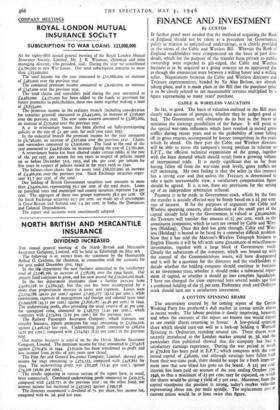FINANCE AND INVESTMENT
By CUSTOS
IF further proof were needed that the method of acquiring the Bank of England should not be taken as a precedent for Government policy in relation to nationalised undertakings, it is clearly provided in the terms of the Cable and Wireless Bill. Whereas the Bank of England stockholders were compensated on the basis of past divi- dends, which for the purpose of the transfer from private to public ownership were regarded as gilt-edged, the Cable and Wireless business is to be acquired as a going concern on an appointed day as though the transaction were between a willing buyer and a willing seller. Negotiations between the Cable and Wireless directors and Treasury representatives, headed by Sir Alan Barlow, are already taking place, and it is made plain in the Bill that the purchase price is to be closely related to net maintainable revenue multiplied by a figure representing so many years' purchase.
CABLE & WIRELESS VALUATION
So far, so good. The basis of valuation outlined in the Bill must clearly take account of prospects, whether they be judged good or bad. The Government will obviously do its best as the buyer to minimise the earnings possibilities of the future. It will point to the special war-time influences which have resulted in record gross traffics during recent years and to the probability of some falling off in gross returns, accompanied by keener competition in the years which lie ahead. On their part the Cable and Wireless directors will be able, to stress the company's strong position in relation to E.P.T., the efficient technical organisation of the group, together with the keen demand which should result from a growing volume of international trade. It is surely significant that so far from having fallen off from the war-time peak levels, gross traffics are still increasing. My own feeling is that the seller in this instance has a strong case and that unless the Treasury is determined to take a quite unreasonable view, a satisfactory compensation figure should be agreed. If it is not, there are provisions for the setting up of an independent arbitration tribunal.
Payment is to be made in Government stock, which by the time the transfer is actually effected may be firmly based on a 2} per cent. rate of interest. If for the purposes of argument the Cable and Wireless operating concern, after deduction of the small part of the capital already held by the Government, is valued at £3o,000,000, the Treasury will transfer that amount of 2.4 per cent. stock to the constituent companies, which in turn are owned by Cable and Wire- less (Holding). Once this deal has gone through, Cable and Wire- less (Holding) is.bound to be faced by a somewhat difficult problem. Now that it has sold the Marconi's Wireless Telegraph business to English Electric it will be left with some £to,000,000 of miscellaneous investments, together with a large block of Government stock. Clearly the substratum of the company, whiCh was bound up with the control of the Communications assets, will have disappeared and it will be a question for the directors and the stockholders to decide whether the holding company should continue in business as an investment trust, whether it should make a substantial repay- ment of capital, or whether it should go into complete liquidation. I have not changed the view expressed here several weeks agd that a combined holding of the 5+ per cent. ?reference stock and Ordinary stock should turn out a satisfactory investment.
A COTTON SPINNING SHARE
The uncertainty created by the coming report of the Cotton Working Party has produced a dull market in cotton textile shares in recent weeks. The labour position is slowly improving, however, and when the contents of the report are known one would expect to see textile shares returning to favour. A low-priced spinning share which should turn out well as a lock-up holding is Werneth Spinning 2s. Ordinaries, standing around los. These shares were recently introduced to the London market around 9s. 3d. and the particulars then published showed that the company • has had a satisfactory earnings experience. During the war period as much as £70,810 has been paid in E.P.T., which compares with the total issued capital of £48,000, and although earnings have fallen back from their war-time peak, there should be scope for a fresh improve- ment now that new blood has gone on the board. A I* per cent. interim has been paid on account of the year ending October 31st, 1946, so that a minimum of 25 per cent. may be expected, on which the shares would be giving a yield of 5 per cent. Moreover, from the capital standpoint the position is strong, today's market valuation representing about 20S. per mule spindle. The replacement cost It current prices would be at least twice that figure.






























 Previous page
Previous page